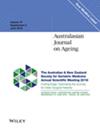Pilot implementation of the mod-REFS frailty screening tool in an Australian home care provider to improve client health and well-being
Abstract
Objective
Frailty refers to increased vulnerability and decreased resilience with associated increased risk of adverse health outcomes. Frailty mostly affects older adults; hence, early identification is necessary to prevent further decline. To help optimise health and well-being, we aimed to implement a holistic frailty screening tool, the modified Reported Edmonton Frail Scale (mod-REFS) within an Australian aged and community home care provider.
Methods
The Implementation Framework for Aged Care guided implementation and evaluation, including co-design with key stakeholders. Clinical (nurses and allied health) and non-clinical (personal care workers) home care staff administered the mod-REFS in a pilot. Evaluation of feasibility, acceptability and fidelity of the tool was undertaken using administrative data alongside a staff survey.
Results
Between July and October 2023, the mod-REFS was completed for 218 clients from Queensland and Victoria, with almost two-thirds (n = 142, 65%) identified as either prefrail (n = 57, 26%) or frail (n = 85, 39%). A greater percentage were prefrail and frail in Victoria than in Queensland. The staff survey (n = 27) identified that the mod-REFS was considered helpful by most (n = 15, 55%); quick, easy to use, concise, very practical; and able to identify frailty levels and other important issues such as depression. Most staff (n = 23, 85%) required no training to use the tool.
Conclusions
Implementing the mod-REFS to identify prefrailty or frailty was feasible and acceptable when administered by a range of home care staff. Implementation requires input from all stakeholders. Early identification and intervention could prevent deterioration and improve well-being of those receiving home care services.

 求助内容:
求助内容: 应助结果提醒方式:
应助结果提醒方式:


